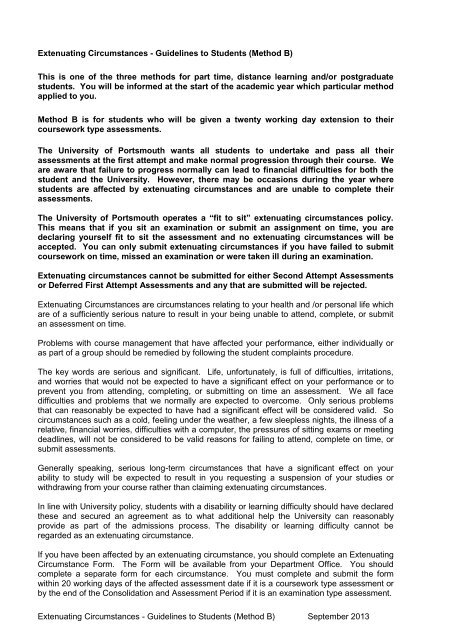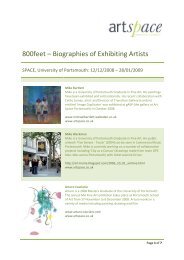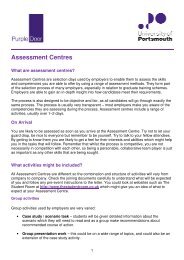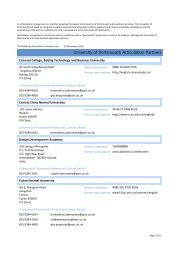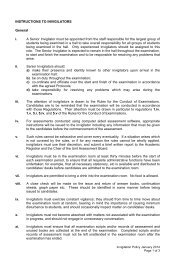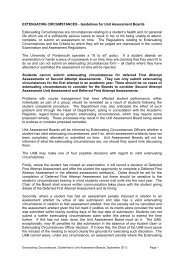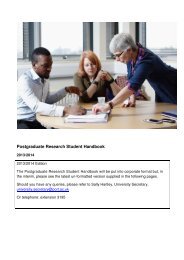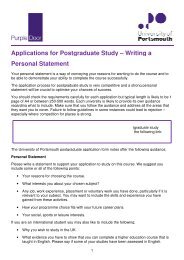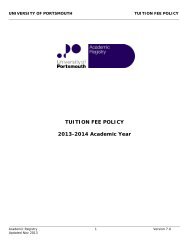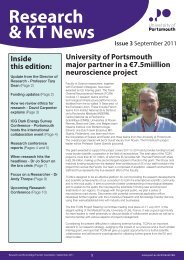Extenuating Circumstances - Guidelines to Students (Method B)
Extenuating Circumstances - Guidelines to Students (Method B)
Extenuating Circumstances - Guidelines to Students (Method B)
Create successful ePaper yourself
Turn your PDF publications into a flip-book with our unique Google optimized e-Paper software.
<strong>Extenuating</strong> <strong>Circumstances</strong> - <strong>Guidelines</strong> <strong>to</strong> <strong>Students</strong> (<strong>Method</strong> B)<br />
This is one of the three methods for part time, distance learning and/or postgraduate<br />
students. You will be informed at the start of the academic year which particular method<br />
applied <strong>to</strong> you.<br />
<strong>Method</strong> B is for students who will be given a twenty working day extension <strong>to</strong> their<br />
coursework type assessments.<br />
The University of Portsmouth wants all students <strong>to</strong> undertake and pass all their<br />
assessments at the first attempt and make normal progression through their course. We<br />
are aware that failure <strong>to</strong> progress normally can lead <strong>to</strong> financial difficulties for both the<br />
student and the University. However, there may be occasions during the year where<br />
students are affected by extenuating circumstances and are unable <strong>to</strong> complete their<br />
assessments.<br />
The University of Portsmouth operates a “fit <strong>to</strong> sit” extenuating circumstances policy.<br />
This means that if you sit an examination or submit an assignment on time, you are<br />
declaring yourself fit <strong>to</strong> sit the assessment and no extenuating circumstances will be<br />
accepted. You can only submit extenuating circumstances if you have failed <strong>to</strong> submit<br />
coursework on time, missed an examination or were taken ill during an examination.<br />
<strong>Extenuating</strong> circumstances cannot be submitted for either Second Attempt Assessments<br />
or Deferred First Attempt Assessments and any that are submitted will be rejected.<br />
<strong>Extenuating</strong> <strong>Circumstances</strong> are circumstances relating <strong>to</strong> your health and /or personal life which<br />
are of a sufficiently serious nature <strong>to</strong> result in your being unable <strong>to</strong> attend, complete, or submit<br />
an assessment on time.<br />
Problems with course management that have affected your performance, either individually or<br />
as part of a group should be remedied by following the student complaints procedure.<br />
The key words are serious and significant. Life, unfortunately, is full of difficulties, irritations,<br />
and worries that would not be expected <strong>to</strong> have a significant effect on your performance or <strong>to</strong><br />
prevent you from attending, completing, or submitting on time an assessment. We all face<br />
difficulties and problems that we normally are expected <strong>to</strong> overcome. Only serious problems<br />
that can reasonably be expected <strong>to</strong> have had a significant effect will be considered valid. So<br />
circumstances such as a cold, feeling under the weather, a few sleepless nights, the illness of a<br />
relative, financial worries, difficulties with a computer, the pressures of sitting exams or meeting<br />
deadlines, will not be considered <strong>to</strong> be valid reasons for failing <strong>to</strong> attend, complete on time, or<br />
submit assessments.<br />
Generally speaking, serious long-term circumstances that have a significant effect on your<br />
ability <strong>to</strong> study will be expected <strong>to</strong> result in you requesting a suspension of your studies or<br />
withdrawing from your course rather than claiming extenuating circumstances.<br />
In line with University policy, students with a disability or learning difficulty should have declared<br />
these and secured an agreement as <strong>to</strong> what additional help the University can reasonably<br />
provide as part of the admissions process. The disability or learning difficulty cannot be<br />
regarded as an extenuating circumstance.<br />
If you have been affected by an extenuating circumstance, you should complete an <strong>Extenuating</strong><br />
Circumstance Form. The Form will be available from your Department Office. You should<br />
complete a separate form for each circumstance. You must complete and submit the form<br />
within 20 working days of the affected assessment date if it is a coursework type assessment or<br />
by the end of the Consolidation and Assessment Period if it is an examination type assessment.<br />
<strong>Extenuating</strong> <strong>Circumstances</strong> - <strong>Guidelines</strong> <strong>to</strong> <strong>Students</strong> (<strong>Method</strong> B) September 2013
The <strong>Students</strong> Union academic caseworkers will be able <strong>to</strong> advise you on completing the form,<br />
as will named members of your own department. When you complete the form you should take<br />
care <strong>to</strong> record exactly which assessment artefacts have been affected (by assessment artefact<br />
we mean the particular examination, course work, essay, labora<strong>to</strong>ry report, presentation etc).<br />
You must link these assessment artefacts <strong>to</strong> the particular unit(s) they have been set for. Most<br />
importantly, you must clearly state a case that explains why the circumstances were serious and<br />
how they affected your ability <strong>to</strong> attend or submit the assessment artefact. You will need <strong>to</strong><br />
relate the dates of the circumstance(s) and the assessment(s) carefully <strong>to</strong> the reasons you give.<br />
The end product needs <strong>to</strong> be convincing. Finally, you need <strong>to</strong> be able <strong>to</strong> provide some<br />
evidence <strong>to</strong> back up your case. Documentary evidence must either be in English, or<br />
accompanied by an official translation in English.<br />
The criteria explain what types of evidence are acceptable. In cases of illness, you should<br />
obtain a medical certificate if your illness prevents you from attending the University for more<br />
than five working days or if you have a severe medical condition that means you have been<br />
unable <strong>to</strong> complete a coursework assignment or attend an examination - if your illness or<br />
condition did not last that long or the medical condition was not severe, you will need <strong>to</strong> submit<br />
a note of self-certification. Please note that medical certificates should be signed whilst the<br />
symp<strong>to</strong>ms of your illness or condition were still evident <strong>to</strong> the Doc<strong>to</strong>r. Repeated cases of selfcertification<br />
will mean that the University will ask you for a signed release so that your doc<strong>to</strong>r<br />
can provide information about your state of health. Repeated cases of self-certification where<br />
there is no such supporting evidence may be judged <strong>to</strong> be invalid.<br />
Reference <strong>to</strong> a professional relationship in the criteria may be <strong>to</strong> a doc<strong>to</strong>r, a counsellor or other<br />
appropriate member of student support services, or some other professional person who,<br />
through the nature of their professional relationship with you, knows about your difficulties and<br />
can confirm what you are claiming.<br />
Your submitted form will be judged by an <strong>Extenuating</strong> <strong>Circumstances</strong> Officer appointed <strong>to</strong><br />
consider all submitted cases in your Department, judging them against the criteria published<br />
annually by the University. You will be notified of the names of the <strong>Extenuating</strong> <strong>Circumstances</strong><br />
Officers by your Department at the start of the Academic Year. The <strong>Extenuating</strong> <strong>Circumstances</strong><br />
Officer will decide whether they consider your case <strong>to</strong> be valid and, if so, which assessment<br />
artefacts in which units have been affected. The decision will be checked by another<br />
<strong>Extenuating</strong> <strong>Circumstances</strong> Officer <strong>to</strong> confirm that it is reasonable and you will be informed of<br />
the outcome within ten working days of submitting the form.<br />
If you have particularly distressing extenuating circumstances which you wish <strong>to</strong> be dealt with as<br />
confidentially as possible, you should contact your Head of Department directly, who will follow<br />
a special procedure for Serious and Confidential <strong>Circumstances</strong>. If you do not wish <strong>to</strong> contact<br />
the Head of Department, you may contact any member of University staff. That person,<br />
however, will have <strong>to</strong> then follow the appropriate procedure in intervening on your behalf, i.e.<br />
they must contact the Head of Department.<br />
Should the <strong>Extenuating</strong> <strong>Circumstances</strong> Officer consider your circumstances <strong>to</strong> be valid, the Unit<br />
Assessment Board and Board of Examiners will be advised that, in particular named<br />
assessment artefacts, your attendance or submission was prevented by valid extenuating<br />
circumstances.<br />
Unit Assessment Boards may choose one of the following outcomes for students with valid<br />
extenuating circumstances:<br />
At the first attempt, if you have failed <strong>to</strong> attend an examination type assessment (which is<br />
any assessment undertaken within a constrained period of time at a set location such as<br />
examinations, in class tests, presentations and oral examinations) the Unit Assessment<br />
Board may allow you <strong>to</strong> have a Deferred First Attempt Assessment.<br />
If you have successfully completed at least two other assessments in the affected unit, the<br />
Unit Assessment Board may extrapolate an overall mark from these, if it is satisfied there<br />
is sufficient evidence you have met the learning outcomes of the unit.<br />
<strong>Extenuating</strong> <strong>Circumstances</strong> - <strong>Guidelines</strong> <strong>to</strong> <strong>Students</strong> (<strong>Method</strong> B) September 2013
Should you fail <strong>to</strong> submit a coursework assessment on time and an assessment penalty<br />
has been applied, that penalty will be lifted as long as you have submitted within twenty<br />
working days of the original date of submission. You can not submit a further extenuating<br />
circumstances claim within this period <strong>to</strong> extend the time further.<br />
Should you be unsure whether your assessment artefact is considered coursework or an<br />
examination, please contact the Unit Co-ordina<strong>to</strong>r.<br />
The Unit Assessment Board may decide that even if you were <strong>to</strong> pass the Deferred First<br />
Attempt Assessment, you would not be able <strong>to</strong> achieve the pass mark required for the unit. In<br />
such cases the Unit Assessment Board will make the decision as if you did not have valid<br />
extenuating circumstances.<br />
Should you fail your Deferred First Attempt Assessment, you will be deemed <strong>to</strong> have failed the<br />
unit and will not be eligible <strong>to</strong> progress in<strong>to</strong> the next academic year. You can not submit<br />
additional extenuating circumstances for deferral work.<br />
No student will be allowed <strong>to</strong> trail units or carry deferrals in<strong>to</strong> the next academic year.<br />
Please also note that a penalty imposed because of an assessment offence, other than late<br />
submission, or because of disciplinary action taken by the University against you, will over-ride<br />
a valid extenuating circumstance and will invalidate the remedies explained above.<br />
Useful Links<br />
<strong>Extenuating</strong> <strong>Circumstances</strong> – Guidance for Unit Assessment Boards<br />
<strong>Extenuating</strong> <strong>Circumstances</strong> – Criteria<br />
<strong>Extenuating</strong> <strong>Circumstances</strong> – Guidance for Boards of Examiners<br />
<strong>Extenuating</strong> <strong>Circumstances</strong> – Guidance for <strong>Extenuating</strong> <strong>Circumstances</strong> Officers<br />
<strong>Extenuating</strong> <strong>Circumstances</strong> – Procedures<br />
Withdrawal and Suspension of Studies<br />
<strong>Extenuating</strong> circumstances<br />
Coursework<br />
Examinations<br />
Unit Assessment Boards<br />
<strong>Extenuating</strong> <strong>Circumstances</strong> - <strong>Guidelines</strong> <strong>to</strong> <strong>Students</strong> (<strong>Method</strong> B) September 2013


